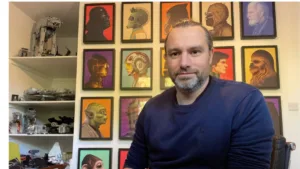Jeremy has recently joined Happy Finish after a seven-year stint with Zappar. We asked Jeremy to tell us all about his Digital Hero
Who is your digital hero?
Demis Hassabis – CEO & Co-founder of DeepMind.
What have they done to win hero status in your eyes?
The more you read about Demis Hassabis, the more impressive he becomes. Aside from being a child-chess prodigy and designing the game Theme Park (a childhood favourite of mine), he co-founded DeepMind – a company I find completely fascinating. Their creation of AI-driven superhuman Atari, chess and Go ‘players’ initially caught my eye but the announcement of their work on protein-folding structures was truly mind-blowing and a huge leap forward in the field. DeepMind’s research has already had far-reaching implications in the world of science and medicine and I’m fascinated to see some of the research projects they turn their attention to next.
How has their heroism helped drive digital?
The team at DeepMind have paved the way for computers to solve some of the most complex challenges out there and this will have definitely contributed towards shifting mindsets around to digital-driven solutions to problems.
In digital, we’ve seen far too many of the ‘solution without a problem’ approach to technology but more and more we’re seeing businesses look to digital to address real business problems rather than using gimmicky solutions for the sake of ‘innovation’.
At Happy Finish, we sometimes see partners coming to us saying they want to use XR for a project without thinking of why or whether it’s right for their objectives. One thing we’ve learned is that it’s only by being as agnostic as possible about the direction of the campaign can we create truly meaningful and successful experiences and campaigns.
What are the biggest challenges in digital we need another hero to solve?
As we step further towards digital words, it’s essential to ensure the technology is as inclusive as possible to those with disabilities. This needs to be tackled from both sides by the storytellers (i.e. brands) and by the tech providers. We’ve already seen some exciting uses of computer vision to act as vision aids and I hope that when there is wider adoption of some form of mixed-reality headset that we continue to see developers and hardware manufactures make progress in this space.
What is your most heroic personal achievement so far in digital?
I think working on an augmented reality STEM learning course for kids to learn about the water cycle was one of my most rewarding projects to work on. We’ve already seen some great studies of the effect AR/VR has on memory retention and I think it’s clear that more immersive media forms will play a key role in the future of education and training









